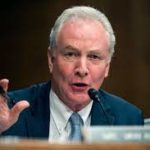Check out the website: https://lenspoliticalnotes.com Look at the recent Political Notes and Len’s Letters on the website:
October 4th , 2022 Political Note #510 Maryland, Virginia, and North Carolina elections
2022 General Election
Except for Delaware, these states are bigger than you might think
North Carolina is our 9th largest state.
Virginia our 12th
Maryland our 19th.
Delaware our 45th
Together, they are larger than Florida, but smaller than Texas. They have eight senators among them. North Carolina has a serious Senate contest. Maryland has the appearance of a contest. Together, they have 34 Congressional districts. Very few are competitive. Except for Delaware, they might have a total of three districts where we could not now guess the outcome.
Virginia’s statewide elections are in odd numbered years. The others have state elections in 2022.
US Senate
Virginia does not have a Senate race until 2024. Neither does Delaware.
North Carolina.

Cheri Beasley
This is the big race. Cheri Beasley (Political Note #434) could flip a Senate seat. She would not be in this race, but for 402 North Carolina voters. In 2020, as the incumbent Chief Justice of the North Carolina Supreme Court, she lost by 401 votes. She asked for a recount. These days you have to note, she did not speak to North Carolina’s Secretary of State about finding 402 votes. She did not claim the vote was rigged. On December 3, after the recount was completed, she congratulated her replacement and contemplated her future.
Her past had been lawyerly and judicial, except that judges are elected in North Carolina. Cheri Beasley grew up in Tennessee where her mother was Dean of Austin Peay’s School of Nursing. She went to Rutgers for her BA and returned to the University of Tennessee for her law degree. Her first job was as a public defender in North Carolina. Appointed a district judge in 1999, she was elected to that role in in 2002 and 2006. She ran for and was elected an Appeals Court judge in 2008 and was appointed to the state Supreme Court. She was elected to that position in 2014. She was an Associate Justice in 2019 when she was appointed Chief Justice. It was in 2020 that she ran for election and lost by that 401 votes. There is an extremely important Supreme Court election coming up in November.
In 2022, Cheri Beasley is running for the US Senate. She is certainly well known in North Carolina. Her principal campaign issue is to make health care affordable to all. She can point to her own struggles with insurance companies for the surgery and treatments necessary for her twin sons. She is looking for improvements in the Affordable Care Act and expanded access for women to reproductive health. Her second issue is to make greater investment in children – from universal early childhood education to fully funding the federal law supporting special education to greater post-secondary educational opportunities.
Her opponent for this seat previously held by a Republican who retired is Congressman Ted Budd, another Donald Trump endorsee. Budd was raised on a cattle and chicken farm by an at home mom and a father who owned a large facilities service company. Budd went into business as well. He opened a gun store. He says he is opposing the “Left’s woke, socialist agenda.” He insists that Democratic proposals like Joe Biden’s Build Back Better would destroy the free market system. His second issue is to stop what he claims is unchecked illegal immigration at the southern border. He would finish building Donald Trump’s wall.
- On October 2nd , 538 projected that Beasley would win 34 times in 100 and found that she was behind 47.6 – 50.3
- Recent Polls can help but in this instance raise anxiety on both sides.
- A Republican funded B+ rated poll reported on September 26th the race was tied at 44
- An independently funded B/C rated poll reported on September 23rd the race was tied at 41
- An independently funded B- rated poll reported on September 20th that Beasley was leading 49-48
- A media funded A-rated poll reported on September 16th that Beasley was behind 43-46
- An independently funded B/C rated poll reported on September 10th that Beasley was behind 46-49
- A Republican funded A- rated poll reported on September 4th that Beasley was behind 44-47
- An independently funded A- rated poll reported on August 30th that Beasley was ahead 42-41
- At the beginning of July, Cheri Beasley had $4.8 million available for the campaign, Ted Budd had $1.8 million
Maryland

Chris Van Hollen
Incumbent Democrat Chris Van Hollen should not break a sweat in his reelection campaign. Maryland is overwhelmingly a Democratic state. Even in an overwhelmingly Democratic state, candidates need to campaign. After all Maryland’s Republican governor is not running again only because he was limited to two terms.
The son of a diplomat, Chris Van Hollen was born in Karachi, Pakistan. He went to Swarthmore, got an MPP from Harvard’s Kennedy School, and a JD from Georgetown. His first job was as an aide to a Republican Senator, but moved on to work for Democrats. He was elected to the Maryland legislature as a Democrat. He was elected to the US House of Representatives in 2002 and remained for 14 years before he was elected to the US Senate in 2016.
Chris Van Hollen’s principal issue is education – support for child care and early childhood education — Head Start and universal Pre-K. He would fully fund Title I which is educational support for children in low income communities as well as special education services. The early childhood focus has an economic purpose, helping families which need these services to be able to work. His other educational focus – job training, Pell grants, support for institutions like the Historically Black Colleges are also focused on providing quality education and improving economic opportunities.
Chris Van Hollen’s opponent is Chris Chaffee, owner of an electrical business, a hunter and fisherman who believes in family values and believes Democratic spending caused inflation.
- On October 2nd , 538 projected that Van Hollen would win more than 99 times in 100 and found that he was ahead 63.5 – 36.5
- Recent Polls help
- A media funded unrated poll reported on September 12th that Van Hollen was leading 56-33
- At the beginning of July, Chris Van Hollen had $4 million available for the campaign, Chris Chaffee has not reported any financial information.
State Supreme Courts
Of these four states, only North Carolina elects its Supreme Court. Districting North Carolina’s Congressional seats has been an ongoing and difficult issue. Prior to the 2020 election, the NC Supreme Court was considering an appeal of the proposed Congressional districts that would have led to a delegation with 10 Republicans and 3 Democrats. Both parties agreed on a temporary compromise – districts that yielded a delegation of 8 Republicans and 5 Democrats. The Court will reconsider the issue after the 2022 election.
Candidates for the North Carolina Supreme Court run in partisan elections. Four of the seven justices are Democrats; three are Republicans. Both seats up for election are held by Democrats. A Republican victory in one of those seats would flip the Court to 4-3 Republican. A Republican victory in both of those seats would make the Court 5-2 Republican. (Political Note #443)
NC Supreme Court Seat 3
Lucy Noble Inman
The Democratic incumbent is not running for this seat. Lucy Noble Inman, Associate Justice of the Court of Appeals is the Democratic candidate. Her great grandfather was Josephus Daniels, once the owner of North Carolina’s largest newspaper and Woodrow Wilson’s Secretary of the Navy. Politically, he resembled Wilson – progressive enough to support public ownership of telephone and telegraph companies, racist enough to oppose Blacks voting. Her mother, Lucy Daniels, was a best selling novelist and a nationally known psychologist. Lucy Noble Inman has been an advocate for mental health services and, when practicing law, represented victims of sexual abuse and of fraud. In 2010, she was appointed a district judge. In 2014, she was elected to the Court of Appeals. And in 2020, she lost a race for the NC Supreme Court.
This year, she is running against Richard Dietz. After practicing international law in a 650 attorney firm, Dietz was also elected to the Court of Appeals in 2014. The Federalist Society describes him as having handled, when in private practice, cases on gun rights, religious liberty, and the free speech of students. Help Lucy Noble Inman’s election to the North Carolina Supreme Court. She and her fellow Democratic candidate, could be the difference between democracy and its absence in North Carolina and the United States of America.
NC Supreme Court Seat 5.
Sam Ervin IV
Those of us old enough to remember Richard Nixon have a vivid memory of Sam Ervin Jr. chairing the committee that managed what would have been the impeachment of the President had Nixon not resigned. Sam Erving Jr. was known as a constitutional scholar. Notwithstanding how tough he was on Nixon, he did not support racial integration or a change in the southern social order. His son, Sam Ervin III was a judge on the Fourth Circuit of the US Court of Appeals. Nominated by Jimmy Carter, he was a kind of family transition figure. In an oral history, he recalled when he came to appreciate the obstacles Black men and women faced and the need to remove those obstacles. Sam Ervin IV had been a member of the NC Utilities Commission and Chaired the National Association of Regulatory Commissioners. He was elected to the NC Court of Appeals in 2008, lost a race to the then and now incumbent Chief Justice of the Supreme Court in 2012, and was elected to the Supreme Court in 2014. By 2022, the North Carolina Supreme Court has been divided on political grounds, Sam Ervin IV is identified as decidedly among the Democrats who are not very different from national, progressive Democrats.
Trey Allen is the Republican candidate for this seat. He spent a substantial portion of his career in the marines, as a judge advocate. When he returned to civilian life, he became clerk to then Chief Justice Paul Newby (He is Chief Justice again now, having defeated Cheri Beasley by 401 votes). Completing the clerkship he became a partner in a firm in Raleigh, then joined the faculty at the University of North Carolina law school. After Paul Newby was installed as Chief Justice in 2021, he hired Trey Allen as General Counsel to the North Carolina Administrative Office of the Courts. Almost a year ago, polls showed Sam Ervin IV behind by double digits. I see no recent polls, but a lot has changed since then. Candidates for Congress who were ahead by double digits are now in close races. Your donation to support Sam Ervin IV can make a difference.
US Congress
North Carolina
North Carolina’s Congressional districts are so revised, it hardly makes sense to discuss which seats are flipped. Before redistricting, NC had 7 Republican seats and 6 Democratic seats. After redistricting, you can count 8 seats with a Republican lean and 6 seats with a Democratic lean
Some seats seem solidly in the hands of one party or the other. Of all the seats in North Carolina, one is close. Two others, perhaps a third, are worth mentioning.
NC 14 D+11

Jeff Jackson
Originally an R+12 district, the one term agreement made it a D+11 lean. State Senator Jeff Jackson had dropped out of the US Senate race – clearing the field of any serious opponents for Cheri Beasley. He made a lot of friends with that decision and cleared the Congressional race for himself. Jeff Jackson’s Republican opponent is Pat Harrigan, a graduate of West Point who has served as an Army Ranger and a Green Beret. While he was deployed in Afghanistan, he and his wife started a firearms business out of their home. Out of the service, he created a substantial firearms business, now in a 120,000 square foot facility.
- On Octoberr 2nd , 538 projected that Jackson would win 97 times in 100 and found that he was ahead 57.4 – 42.6
- There are no available polls
- At the beginning of July, Jeff Hackson had $1.2 million available for the campaign, Pat Harrigan had $170,000.
NC 01 D+5

Don Davis
Initially, an R+18 district, NC 01 became D+5. State Senator Don Davis won the Democratic primary by a 2-1 margin. He was born and grew up in Snow Hill, North Carolina. He was appointed to the US Air Force Academy where he got his BA. He returned to North Carolina in the reserves, became an assistant professor of aeronautics studies at Eastern Carolina University, and earned degrees including an EdD in higher education administration. He was elected to the state senate, lost, and a few years later, was reelected. His focus as a Member of Congress would be local – dealing with the consequences of neglect for the rural South. Don Davis’s opponent is accountant Sandy Smith whose past caught up with her. The DCCC, among others, turned up court records in which she was accused of abusing her daughter and her ex-husbands.
- On October 2nd , 538 projected that Davis would win 92 times in 100 and found that he was ahead 52.9 – 45.1
- There are no available recent polls
- A poll in June found Davis leading by 6.
- At the beginning of July, Jeff Jackson had $1.2 million available for the campaign, Pat Harrigan had less than $200,000.
NC 11 R+3

Wiley Nickel
This is North Carolina’s truly competitive House race. Initially, an R+25 seat, NC 13 became R+3. Wiley Nickel (Pollitical Note #474) came to North Carolina from California. His great, great grandfather Henry Miller (not the novelist) was a butcher in New York City. He Americanized his name and moved to California. He and a partner intended to raise cattle. They bought land and land and land — 1.4 million acres of land in California. Still more in Oregon and Nevada. The land was broken up after Henry Miller’s death, but his descendants were more than prosperous.
Wiley Nickel is a descendant. His wife, however, was from North Carolina. After he had a failed run for office in California and a little experience in national politics, she persuaded him to try North Carolina. She was a lawyer, too, and also became co-owner of her dad’s jewelry business. Wiley Nickel ran for the state senate, to replace Josh Stein who had become Attorney General. In the state Senate, Wiley Nickel advocated for teachers’ pay, for expanding the definition of hate crimes, and the creation of a hate crimes data base. Running for Congress, he defeated the second place candidate in the primary by more than 2-1.
His Republican opponent for Congress is Bo Hines, another Donald Trump endorsee. Hines won the Republican primary with only 32% of the vote. Hines has an appeal which I do not understand at all. Football hero? He had one great season as a freshman at North Carolina State in 2014. Thinking it would be better for him in his eventual political life, he transferred to Yale. He played in four games for Yale, had a season ending injury and another the next year. His comeback for his senior year was a failure. He worked for the Governor of Indiana and a South Dakota Senator. He went to Wake Forest Law School (He chose Wake Forest, he said, to get away from northeastern liberals. But would he have been admitted to Yale or Harvard?). His run for Congress is funded, apparently, by the Hines Children’s Trust (one trustee, now deceased, was Gerald D. Hines, a Houston Real Estate Developer). Does Bo Hines have political views? He is opposed to abortion without exception and he believes the 2020 election was stolen from Donald Trump. Help Wiley Nickel . Wiley is a grown up with political views we can respect. The US Congress will be a better place with him in it.
- On October 2nd , 538 projected that Nickel would win 32 times in 100 and found that he was behind 48.5-51.5
- Recent polls can be helpful
- A Democratic funded B/C rated poll reported on September 1st that Wiley Nickel was leading Bo Hines 44-40
- An independently funded A- rated poll reported on August 24th that Wiley Nickel was tied with Bo Hines 40-40
- An organization that favors term limits funded a B- rated poll that reported on August 6th that Wiley Nickel was trailing Bo Hines 39-44.
- At the beginning of July, Wiley Nickel had $1.2 million available for the campaign, Bo Hines had less than $200,000
MARYLAND
Of Maryland’s 8 Congressional seats, one has a contest, maybe two. The Democrats lost a Gerrymandering lawsuit here. The outgoing governor negotiated a settlement which changed the likelihood of winning enormously.
MD 06 R+1

David Trone
Initially a D+12 seat, the shift to R+1 required a shift in Incumbent David Trone’s campaign. If nothing else he needed to shift his intensity. David Trone (Political Note #466) is a wealthy man, made wealthy by his response and, in a way, his mother’s response, to his father’s bankruptcy. She bought out a small local market and, with her sons, turned it into a liquor store. By the time David Trone was finished with his MBA from Wharton, he had was scaling up liquor stores in the mid-Atlantic states. He learned that he needed to understand and, sometimes, influence legislatures which set restrictions on the sale of alcohol.
David Trone expanded his political interest beyond the sale of alcohol. He developed a healthy skepticism about government interference in business. Appreciative of his attorney, who was a member of the ACLU national board, he tied that distaste for government interference to a commitment to civil liberties. A relative’s death from an opioid overdose led him to an interest in hospitals, to service on a hospital board and to support access to health services. By the time he was ready to run for Congress, he had built a coherent campaign.
He ran for Congress in 2016 and lost, spending his own money. He ran again in 2018 in MD 06. This time he ran a more inclusive campaign and got himself elected and then reelected in 2020. 2022 is a new challenge in a district remade so that it is more conservative. He faces the same opponent, State Delegate Neil Parrot. Parrot ran a campaign to “Restore Freedom.” He would ensure that only legal living voters voted; that, in the name of the First Amendment, Facebook and Twitter would be prohibited from banning people; that the Second Amendment be available for people to protect their property; and that unborn children have the right to live.
- On October 2nd , 538 projected that Trone would win 63 times in 100 and found that he was ahead 51.1-48.9
- Recent polls can be helpful
- An organization favoring term limits funded a B- rated poll that reported on August 9th that Trone was behind 43-45
- At the beginning of July, David Trone had $10.7 million available for the campaign, Neil Parrot had $350,000.
VIRGINIA
Of Virginia’s 10 Members of Congress, two Democrats are vulnerable
VA 02 R+6
Elaine Luria has the tougher task of the vulnerable Virginians. Her district could feel like one giant naval base. A member of the Problem Solvers caucus, seeking to find bipartisan solutions, she is conservative enough for a substantial portion of her revised district. Is she conservative enough to win.
She was born in Birmingham Alabama to a family that had its start in the state as peddlers to coal miners. Her great grandfather had helped establish a Jewish congregation in Jasper Alabama and the family joined the Temple in Birmingham. By the time Elaine Luria was ready for high school, they could afford to send her to the private Indian Springs School from which she graduated and went on to the Naval Academy. She also earned a Master’s degree in engineering at Old Dominion and spent 20 years operating nuclear reactors on navy ships. For the last three years of her tenure in the Navy, she commanded a combat ready assault craft unit of 200 sailors.
She has been a strong supporter of Israel and describes herself as a “security Democrat.” She has supported the completion of a kind of border wall to deal with undocumented immigrants, but circumstances have moved her from the most conservative possible positions. She has supported universal background checks for gun purchases and red flag laws to remove guns from people who demonstrate that they should not have guns. She recognizes the reality of climate change as a serious problem and supports legislation to deal with it. Her sense of nationalism and patriotism has been offended by Donald Trump’s interest in foreign support and his willingness to ignore the true results of the 2020 election. She voted for impeachment and is a member of the January 6 select committee.
Her opponent is State Senator Jen Kiggans, a Navy Veteran and a nurse practitioner. Kiggans blames Joe Biden for inflation and makes that her principal campaign issue. She claims Democrats are discouraging people from returning to work; that the economy would benefit from reduced taxes and reduced regulation.
- On October 2nd , 538 projected that Luria would win 50 times in 100 and found that she and Kiggans were tied at 50.
- There are no available polls
- At the beginning of July, Elaine Luria had $4.3 million available for the campaign, Jen Kiggans had $400,000
VA 07 D+2
Abigail Spanberger
Formerly of the CIA, previously a postal inspector, Abigail Spanberger has survived unfair campaign tactics including illegal wheedling of her records from the post office. Based on those records, Republicans attacked her claiming that she supported terrorists since she taught for a year at a Saudi sponsored private school. In 2018, Steve Bannon said losing this district would mean losing the House of Representatives. Abigail Spangerger won her election and the Republicans lost the House. She has been a leader among moderate Democrats, supporting strong border security. Her opponent is County Supervisor Yesli Vega. Vega begins her campaign suggesting that the Democratic cancel culture is an attack on the constitution and on people of faith. She ties phrases from the Declaration of Independence about life (she is pro-life and anti-abortion), liberty (the government took away people’s liberty in its response to covid), and the pursuit of happiness (the squad and other Democrats, she says, are experimenting with socialism.). Help Abigail Spanberger win this election.
- On October 2nd , 538 projected that Spanberger would win 86 times in 100 and found that Spanberger led 53.4 – 46.6
- Recent polls are helpful
- A term limits supporting organization funded B- rated poll reported on August 6th that Spanberger was ahead 46-41
- At the beginning of July, Abigail Spanberger had $4.9 million available for the campaign, Yesli Vega had $250,000
Gubernatorial elections
North Only Maryland elects a governor in 2024. North Carolina and Delaware elect governors in 2024, Virginia in 2025.
Maryland Governor

Wes Moore
If Wes Moore’s story was less impressive, this piece would be briefer.
He was born in Takoma Park Maryland. His mother, like her mother who had first emigrated from Cuba to Jamaica, was an immigrant from Jamaica. She was a consultant helping businesses use media. His dad, who died when he was four, was a television journalist. After his father’s death, his mom took him and his sisters to live in the Bronx with their grandparents. Wes Moore’s grandmother was a retired school teacher. His grandfather was the Dutch Reformed Church’s first Black minister. They sent him to the Riverdale Country School until his grades declined and he began getting into trouble. They sent him to the Valley Forge Military Academy and College. His Mom and sisters moved back to Baltimore while he stayed at the Military Academy.
Wes Moore graduated with an Associate Degree from the Academy at age 20 and a commission into the Army Reserves. He had a year with Condoleeza Rice as a White House Fellow, interned with Baltimore’s Mayor Schmoke and he enrolled at Johns Hopkins where he also played wide receiver on their football team. He and his fraternity created a program to pair members with juveniles in detention. He did so well at Johns Hopkins that he was named a Rhodes Scholar. After his year in Oxford, he spent a year in Afghanistan deployed in the war as a Captain. Returning to Baltimore, he founded BridgeEdU which helped students transition into their freshman year of college. And he went to work for CitiBank. While working at CitiBank and leading BridgeEdU, he met Wes Moore, also from Baltimore whose troubled life served as a counterpoint to his own. He wrote a book about the two of them called The Other Wes Moore which was published in 2010.
Wes Moore’s life continued in that vein. Leading non-profits. Writing books. Producing films based on the books. Writing newspaper and magazine articles. Receiving honors and occasional criticism. The Baltimore Sun reported that he had improperly received property tax credits and owed back taxes. Sounding believably bewildered, he paid them. The Other Wes Moore generated criticisms that donations he promised to charities had not materialized and that he had exaggerated his role in the other man’s life. A CNN story accused him of embellishing stories about where he grew up. Others criticized his corporate connections.
Notwithstanding the criticisms, others approached him to run for office. He declined those suggestions, but Governor of Maryland seemed right and he felt himself ready for it. He describes himself as center-left and as progressive; as socially moderate and fiscally responsible (corrected from saying he was a strong fiscal conservative). Asked about political role models, he described current Democratic governors Jared Polis of Colorado and Roy Cooper of North Carolina. He also chose Parris Glendening, a Democratic governor of Maryland who was falsely accused of winning based on the votes of dead people, who reformed and reduced taxes and created jobs, helped move NFL teams to Washington and Baltimore, and banned discrimination based on sexual orientation.
His opponent, State Delegate Dan Cox, promises to restore freedom and prosperity to Maryland by ending various health mandates and making schools free from political or gender ideological indoctrination. Fortunately, his chance to win is extremely slim.
- On October 2nd , 538 projected that Wes Moore would win more than 99 times in 100 and that he led 59.7 – 38
- Polls can be helpful
- An independently funded A+ rated poll reported on September 27th that Moore led 60-28
- A media funded unrated poll reported on September 12th that Moore led 53-31.
- On August 31st the Washington Post reported that Wes Moore had $1.3 million to spend on the balance of the campaign, Dan Cox had $130,000
Down Ballot elections
Maryland
Attorney General

Anthony Brown
Born in New York, son of a Swiss educated doctor who emigrated from Cuba to Jamaica to New York, graduate of Harvard College, Anthony Brown served in the army for five years before returning to Harvard to get his law degree. After his clerkship, he joined the WilberHale law firm, working with a leading civil rights attorney. After his election to the Maryland House of Delegates, he joined a more local firm. On Martin O’Malley’s ticket as Lt. Governor, he served as lead on health care issues. The Maryland roll =out for the ACA worked badly, unfortunately. He was much more successful in ensuring that Maryland was well protected in a federal Base Realignment. =
In 2014 Anthony Brown ran for governor and lost to moderate Republican Larry Hogan. In 2016, he turned to the House of Representatives. He won a 6 person primary and has been serving in the House since then. He announced for Attorney General with state and national endorsements and defeated Katie O’Malley, Maryland’s former first lady.
His opponent is Michael Peroutka whose far-right views are unusual for the far-right. He is angry that Maryland did not secede during the Civil War and still believes in conspiracies that led to the 9/11 attack.
- Sabato’s Crystal Ball at the UVA Center for Politics describes this race as solidly Democratic, especially in the light of the Republican choice of candidate.
Comptroller

Brook Lierman has been active in civil rights, as best I can tell, since she attended Walt Whitman High School in Bethesda and maybe before that. She got her Bachelor’s Degree from Dartmouth, worked for AmeriCorps, and went to Law School at the University of Texas. She continued working with children in public housing in Vermont, and as a civil rights attorney in Baltimore. She won a primary for Delegate with 28% of the vote (defeating several candidates). In the House of Delegates she has supported investment in public transit, violence prevention programs, and programs to aid sex trafficking victims. She proposes to modernize the state’s financial system, increase transparency, and use the leverage of the office on behalf of opportunity for everyone in Maryland.
Her opponent is County Executive Barry Glassman. He describes himself as a fiscal conservative who cut property tax rates in 2022.
Delaware
Delaware has somehow become more important than it used to be.
Down Ballot elections
Attorney General

Inc Kathy Jennings
A graduate of the University of Delaware with a 1978 JD from Villanova, Kathy Jennings was a long-time prosecutor for the Delaware Department of Justice for 20 years. She went directly from law school to the Department of Justice prosecuting a variety of cases, most notably the serial murderer Steven Parnell. After that, she served as Chief Deputy to Attorney General Charles Oberly. When he left office in 1995, the two of them established a practice together. In 2011, she returned to the Delaware Department of Justice to head the criminal division at the invitation of Attorney General Beau Biden. She resigned from the Department in 2017 to become the Chief Administrative Officer for New Castle County. In January 2018, she resigned from that person to run for Attorney General. She defeated a four person field in the primary before winning the general election. Her opponent is Julianne Murray who also ran for governor in 2020. A graduate of the University of Arizona with a JD from Widener, she was in practice on her own and later with a partner for eleven years. She runs as a political outsider and, in this race, point particularly at increases in crime.
- Sabato’s Crystal Ball at the UVA Center for Politics describes this race as solidly Democratic.
State Treasurer

Inc Colleen Davis
A graduate of Philadelphia University, where she played soccer on scholarship, she worked as a financial consultant for medical systems and was a surprise winner of the 2018 general election. As treasurer, she takes credit for moving the state from a $250 million deficit to a $1.1 billion surplus. She does not respond to the scandal that has arisen while she was in office, being stopped for driving without a license. Her opponent, Greg Coverdale, has an MBA from Delaware State and provides financial consultation to members of the military.
State Auditor

Lydia York majored in accounting at Florida A&M, worked for Coopers and Lybrand, received an MBA from the Wharton School, and spent ten years at the Mellon Bank and Duquesne power. Then she went to law school where she got a JD and an LLM in taxation. For ten years she was staff attorney for the Investor Protection Division of Stuarts Law in Wilmington, Delaware. She obtained the Democratic Party’s endorsement against Democratic incumbent Kathy McGuiness who faced criminal charges and was convicted of misdemeanors for mishandling public money. Lydia York will face Janice Lorrah, an attorney who, she reports, is certified in forensic accounting and notes that she has worked only part-time since 2016 when her daughter was born. Her claim to fame is her lawsuit against Delaware governor John Carney over his decision to extend the school mask mandate.
If you had $500 to spend on candidates from Maryland, Delaware, Virginia, and North Carolina, you might consider the following:
Cheri Beasley for US Senator $150
Lucy Noble Inman NC Supreme Court $100
Sam Ervin IV NC Supreme Court $100
Wiley Nickel. NC 13 $ 50
David Trone MD 06 $ 50
Elaine Luria VA 02 $ 50
Cautions while donating through Act Blue (most Democratic candidates use Act Blue for online donations)
- Take care to hit the donate button only once. If you hit it a second time, you could be charged for two donations instead of one.
- Take care to watch for an already clicked recurring donation. You can unclick it and donate only once if that is your intent.
- Watch for your receipt. If the receipt indicates a donation different from your intention, reply to Act Blue via the receipt right away. They will fix your donation. They want you to donate only what you intend to donate
Donations to candidates who don’t use Act Blue can be problematic Some donation websites do not have the commitment Act Blue has to ensuring that you donate only what you intend to donate.
